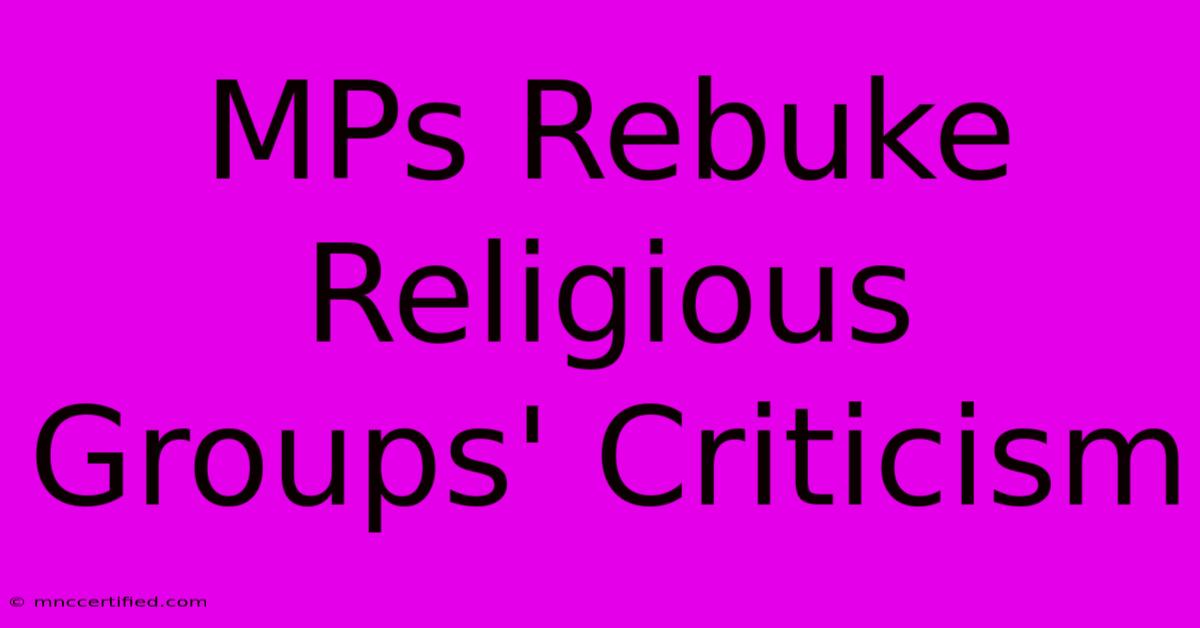MPs Rebuke Religious Groups' Criticism

Table of Contents
MPs Rebuke Religious Groups' Criticism: A Growing Divide?
The recent wave of criticism leveled by religious groups against government policies has sparked a strong rebuke from several Members of Parliament (MPs). This escalating tension highlights a growing divide between the secular and religious spheres, raising important questions about the role of faith in public discourse and the boundaries of political engagement. This article delves into the specifics of the criticisms, the MPs' responses, and the potential implications for the future.
The Source of the Conflict: Specific Religious Criticisms
The primary source of contention stems from [insert specific government policy here]. Religious groups, notably [mention specific religious groups involved, e.g., The Catholic Church, certain Evangelical groups], have voiced strong objections, citing concerns about [state the specific concerns raised, e.g., infringement on religious freedom, erosion of traditional values, negative societal impacts]. Their criticisms have been communicated through [mention the methods used, e.g., public statements, protests, open letters to MPs], aiming to garner public support and influence policy changes. One particularly vocal concern centers on [mention a specific aspect of the criticism, e.g., the impact of the policy on religious education in schools, restrictions on religious gatherings].
Detailed Analysis of Religious Arguments
The arguments presented by the religious groups are multifaceted. They contend that [summarize the core arguments with supporting evidence or quotes, if available]. However, critics argue that these concerns are [present counter-arguments, addressing potential flaws in the religious groups' reasoning]. The debate also touches upon [mention other related issues, e.g., the role of faith in public life, the separation of church and state], adding complexity to the overall discussion.
MPs' Counter-Arguments and Rebuke
Several MPs have responded forcefully to the criticisms, accusing the religious groups of [mention the accusations, e.g., misrepresenting facts, promoting divisive rhetoric, undermining democratic processes]. They argue that the government policy is [explain the government's stance and rationale, using concrete examples]. Prominent MPs, such as [name specific MPs and their party affiliations], have publicly stated [quote their statements or paraphrase their positions, citing credible sources]. The MPs' response emphasizes [mention the key themes in the MPs' counter-arguments, e.g., the importance of evidence-based policymaking, the need for inclusivity, the protection of minority rights].
Analyzing the MPs' Responses
The MPs' responses reveal a range of viewpoints within the political spectrum. While some focus on defending the policy itself, others prioritize the need for [mention specific priorities like open dialogue, compromise, or finding common ground]. The differing approaches highlight the complexities of navigating this sensitive issue and the potential for further polarization.
The Implications and Potential Consequences
The ongoing tension between religious groups and MPs has significant implications for [mention potential consequences, e.g., social cohesion, political stability, future policy decisions]. This conflict could lead to [discuss potential outcomes, e.g., increased social division, further protests, legal challenges]. It is crucial for [mention key stakeholders, e.g., the government, religious leaders, civil society organizations] to engage in constructive dialogue to [suggest solutions, e.g., finding common ground, promoting mutual understanding, fostering respect for diverse perspectives].
Conclusion: Navigating the Future
The rebuke from MPs highlights a critical juncture in the relationship between religious groups and the government. Finding a path forward requires open communication, mutual respect, and a commitment to addressing legitimate concerns while upholding the principles of democratic governance. The success of such efforts will determine the future of this vital debate and its impact on the wider society.
Keywords: MPs, Religious Groups, Criticism, Government Policy, [Insert Specific Policy Name Here], Religious Freedom, Public Discourse, Political Engagement, [Names of Specific Religious Groups], [Names of Specific MPs], Social Cohesion, Debate, Conflict, Dialogue, Compromise.
Note: Remember to replace the bracketed information with specifics relevant to the actual situation. Also, ensure you cite credible sources for all claims and quotes to maintain journalistic integrity and SEO best practices. Conduct thorough research to support your arguments and build a strong, fact-based article.

Thank you for visiting our website wich cover about MPs Rebuke Religious Groups' Criticism. We hope the information provided has been useful to you. Feel free to contact us if you have any questions or need further assistance. See you next time and dont miss to bookmark.
Featured Posts
-
Michael Todd Insurance Fraud
Dec 01, 2024
-
Church Mutual Insurance Jobs
Dec 01, 2024
-
One Sided Twitter In Big Ten Final
Dec 01, 2024
-
Are Trading Cards Media Mail
Dec 01, 2024
-
Nude Trading Discord Servers
Dec 01, 2024